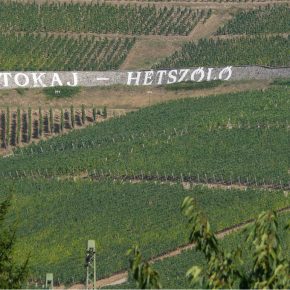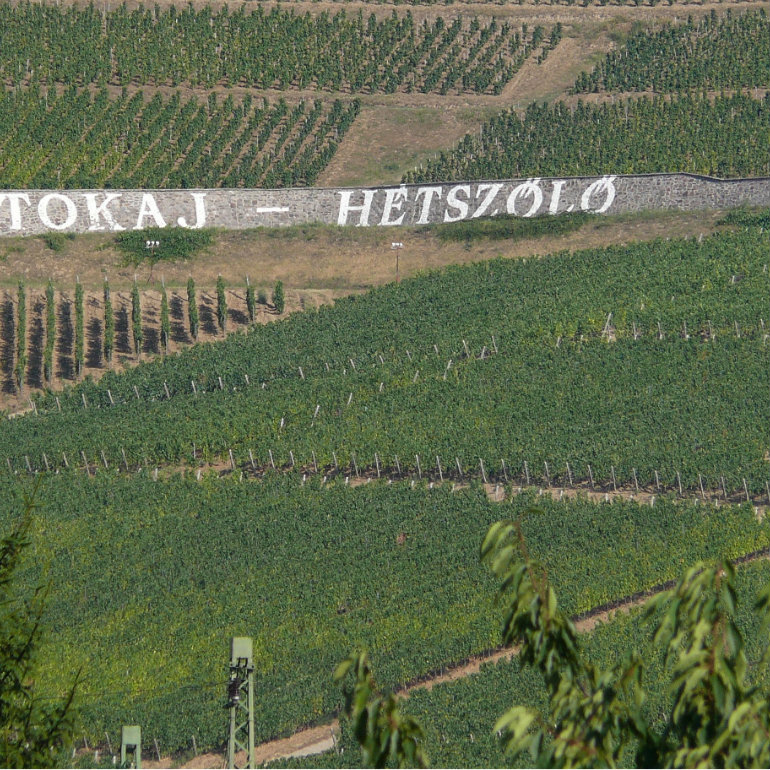Tydzień w gospodarce
Category: Raporty

Tokaj, Borsod-Abauj-Zemplen, Hungary (Gregoriosz, CC BY-NC)
But many Hungarians are suspicious and worry that the real purpose of the sale is to reward „party insiders”. The goal is unlikely to be the officially proclaimed desire to help small farms.
The government expects the sale will bring in about HUF500bn (EUR1.6bn). Buyers can take advantage of preferential long-term loans granted on the condition that they pay in 20 per cent of the purchase price. After the land privatization campaign is completed this spring, 95 per cent of agricultural land in Hungary will be in private hands.
The stated objective of this operation is to help small farms and give them a chance to expand their size. The difference between the market interest rate on bank loans and the preferential one will be covered from the budget.
At first glance, this objective raises no objections – 41,000 agricultural properties offered up for sale have an area of less than 3 hectares, and only 10,000 plots are larger. The offer, however, also includes land estates with an area above 100 hectares, and even ones exceeding 300 hectares, which are additionally classified as first class arable land.
The benefits for the large group of individual farmers invited to take part in the program are, however, questionable. The lands allocated by the state for sale are currently leased. The lease period is 20-50 years, and the fixed-rate lease fee is less than half of its market value. As a result, those buying land currently under lease will not be able to farm their land for several decades. Instead they will take over the lease from the state. The problem is that the lease income will not even cover the interest on the loan taken for the purchase of the additional land.
The situation is entirely different if the land is bought by the current lease holder, who will become the owner and will no longer have to pay the lease. Current leaseholders are granted pre-emptive purchase rights to buy the land — creating a problem,. So far most of those taking part in auctions of state-owned land are lease holders. They are not, for the most part, farmers, but investors from big cities, including oligarchs coalesced around Prime Minister Viktor Orbán’s party – Fidesz. Since this party won power, it has made a habit of leasing state lands with areas of several thousand or even more hectares to certain individuals or companies.
A few years ago, when hundreds of thousands of hectares were leased, the Hungarian press warned that the agreements giving lessees pre-emptive rights to purchase land would soon be used to take ownership of the properties. This was met with opposition, especially since the beneficiaries were people close to Fidesz, who did not want to farm themselves, but whith hired others to do it for them. It was also common that the leased lands were only farmed enough to earn EU subsidies.
Despite efforts to keep the tenders confidential, a court ruled that the documentation had to be made available to all tender participants. And when the documents were made public ,it was possible to clearly identify the ways in which politicians interfered in the procedures. In some places the verification of the bids was carried out in local Fidesz offices. There is concern that the sales increase the size of large farms owned by companies and agricultural oligarchs rather than helping small farmers.
The Land Act, which limits the amount of farmland in the hands of a single owner to 300 hectares and excludes companies from the purchase or sale of agricultural land, does not prevent the creation of agricultural estates. The prohibitions are circumvented in the simplest ways. The law does not forbid separate family members – from great grandfathers to grandchildren – from each owning 300 hectares of land. Trade in certificates of completion of agricultural courses — a requirement for being a farmer —has also increased sharply.
Agricultural companies have also found easy ways to expand their acreages. Bidders in the tenders include not only shareholders, but also their employees, who lease the land out to their employers after buying it. This is helped because there is no limit to the acreage of leased land. That has led to the creation of agricultural estates as large as 15,000-20,000 hectares. These companies farm leased land. They produce most of cereals and meat for domestic consumption and for exports and they often have their own processing plants. As a result, while formally there are hundreds of thousands of farmers in the Hungarian countryside, in reality mainly large and very large enterprises are engaged in agricultural production.
Even within the Fidesz, the government is accused of departing from its slogan of supporting small farmers and in reality backing large farms. Small, family-owned farms can’t make use of the preferential loans, because they usually can’t afford the 20 per cent down payment. Instead, land investments are made by people like Lőrincz Mészáros, mayor of Felcsút, Mr Orbán’s hometown, whose billions of income come from public contracts. Thus Mr Mészáros could say he intended to spend HUF1.2bn (EUR3.8m) on land. If that was his 20 per cent down payment, he would be able to buy thousands of hectares.
Besides being the mayor, Mr Mészáros is also a farmer. Not only does he farm on his own land, but also on the considerable property of the prime minister’s wife. In addition, the mayor manages a football academy in Felcsút, and is the head of the local stadium with 3,500 seats, built in a village with a total population of 1,800 people. Both the stadium and the football academy are financed by the state, which is possible due to tax exemptions for promoting sports.
The Hungarian press is searching for the real goal of the government’s land sale. These doubts are all the more justified, because only a few years ago land was leased out for as much as 50 years. Improving the government budget is not a factor as the government may not allocate the proceeds from land sales to anything other than … the purchase of (other?) land or the development of land already owned by the state. The law would have to be changed to allow the government to use the funds for other purposes. However, Fidesz introduced a requirement that such law be changed with a two-thirds vote in parliament. Prime Minister Orbán, however, lost his super majority a couple of months now, because a Fidesz MP died, and the party’s candidate lost the by-election.
At present a theory circulating in Hungary says the real goal of the operation is the distribution of land to people close to the authorities. This suspicion is reinforced by the fact that according to the Land Act, in order to become the owner of a former state-owned land, it is not enough to win the tender. It is also necessary to obtain the consent of the local council of land-owners, who can appoint another person from the ranks of local farmers. The only problem is that these councils have not been formed, and their powers have passed to the president of the National Chamber of Agriculture – organized and established by the Fidesz government. Membership in the organization is mandatory for all farmers, so granting the right to purchase land therefore depends on the decision of the president of the Chamber, who is designated by Fidesz.
Another theory holds that the goal is to take away leased land from Mr Orbán’s former friend Lajos Simicska, whose numerous companies and friends lease tens of thousands of hectares from the state. In a radio interview, Mr Simicska ––who was Mr Orbán’s closest friend for more than 25 years whom he’d known since university days With Mr Orbán’s help Mr Simicska obtained public contracts worth billions, and he became one of the richest and most influential business people in Hungary. He headed Hungary’s internal revenue service for some time, and before that he had managed the treasury of the Fidesz party.
Thanks to Mr Orbán, Mr Simicska and his friends took control of offices and institutions awarding state and EU funds. When Fidesz was in the opposition, it was largely Mr Simicska who filled the party’s coffers with his own money. In 2014, however, Mr Orbán began removing Mr Simicska’s people, and then Mr Simicska himself, from all sources of public financing,. Mr Simicska apparently insulted the prime minister. Mr Orbán has found a new friend – the mayor of Felcsút. Now it is former plumber Mészáros Lőrincz who wins multi-billion forint public tenders. In two years he became one of the richest businessmen in Hungary.
In light of the government’s about-turn and the draft legislation recently introduced in the parliament, it is difficult not to believe in such rumors. Until now lessees were certain that they still had almost half a century of lease, because the state could not terminate the agreements, or raise the low lease fees. In addition, lessees have pre-emptive rights to purchase their land. That’s why no bids were submitted in the tenders for the lands controlled by Mr. Simicska and his colleagues (among the first to be put up for sale). But a change to the Land Act may completely change the current status, which is beneficial for the lessees. The new law provides (with retroactive effect ) that the lease fee will be updated every five years, and if the lessee does not accept the new rate, the state will be able to terminate the lease agreement.
Minister János Lázár, head of the prime minister’s office, probably best explained the land sale,. During a press conference, he said that it is better if the state-owned lands are in the private hands, as there are no state-owned farms anymore and the state does not farm the land. If state-owned farms still existed, their managers would loot them, regardless of whether Fidesz or the Socialists control the government, he explained.
His comment, however, is difficult to reconcile with the idea long promoted by Mr Orbán’s government that the interests of society are best served through the restoration of state ownership wherever possible. The government is designating more and more areas of economic life in which state-owned companies are to play a leading role, or even enjoy exclusive rights. This approach applies not only to municipal services like water, gas, electricity or sewage.. Nationalization included municipal waste management, as well as chimney sweeping services, elevator maintenance in private buildings or collecting parking charges with mobile phones. Mr Orbán has also founded a state telecommunications company in order to increase competition in the mobile phone market.
The press therefore asks if Mr Lázár is right and the managers of state-owned agricultural companies would steal everything, why isn’t government afraid that managers working in state-owned companies outside of agriculture won’t loot them? The opposition, outraged at the minister’s statements, reported him to the prosecutor general, claiming that it was a public confession to a crime.


